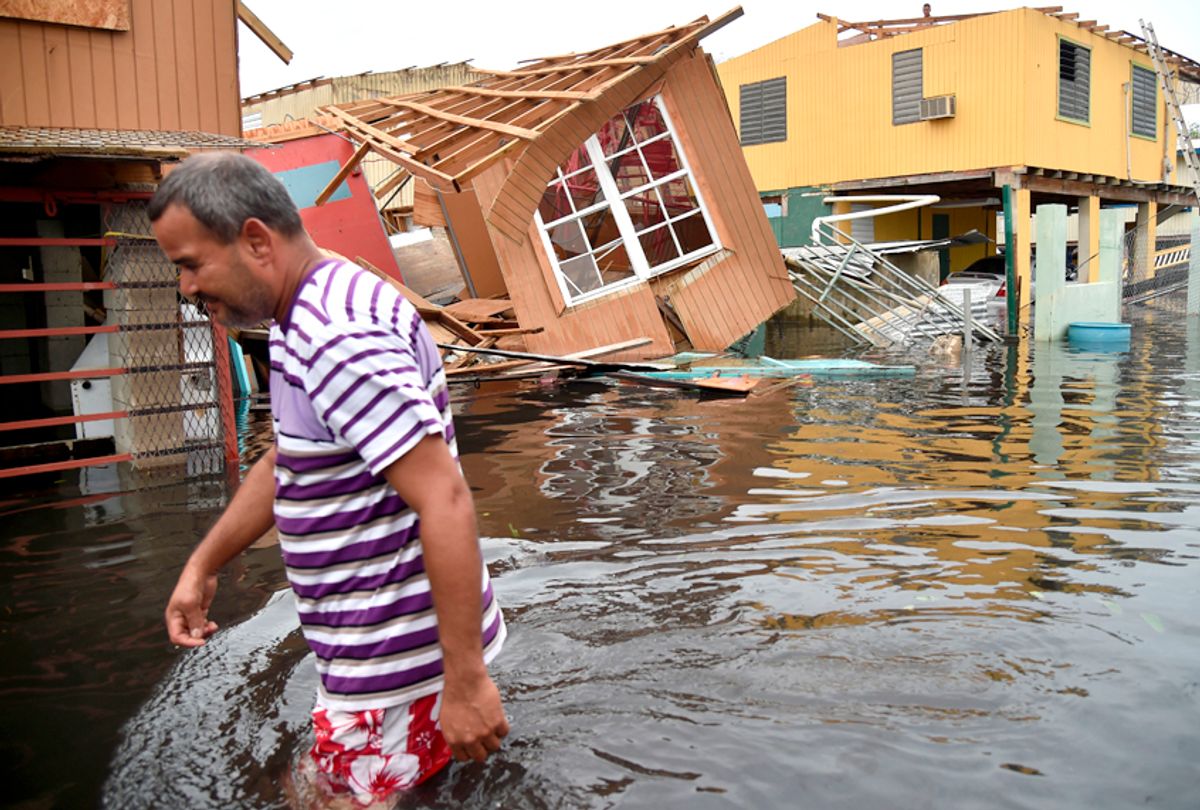Hurricane Maria devastated the island of Puerto Rico when it made landfall on Sep. 20 as a Category 4 storm, and a breathtaking report has now revealed that the death toll, previously thought to be 64 people, could be as high as 1,052.
Daily mortality data from Puerto Rico's vital statistics bureau showed that in the 42 days following the hurricane making landfall, 1,052 more people died than usual when compared to the previous two years, according to a New York Times investigation.
The official public death toll was thought to have been 64, with the last two individuals being added on Saturday.
"Before the hurricane, I had an average of 82 deaths daily. That changes from Sept. 20 to 30th. Now I have an average of 118 deaths daily," Wanda Llovet, the director of the Demographic Registry in Puerto Rico, told the Times during an interview in mid-November. Llovet has since told the newspaper that both figures have gone up by one.
The hurricane pummeled the island and left the entire population, over 3 million people, without any power. But not much as changed as the islands decrepit power grid is still operating at less than 70 percent of its capacity, which has delayed a complete death toll for the month of October, the Times reported. The tally is expected to rise.
One day in particular, Sep. 25, has been determined as the deadliest on the island as 135 people died, compared to the 75 people who died in 2016 and 60 who died in 2015.
With a temperature of 90 degrees and no power throughout nearly the entire island "bedridden people were having trouble getting medical treatment, and dialysis clinics were operating with generators and limiting treatment hours," the Times reported.
It was that same day in which Puerto Rico's Gov. Ricardo Rosselló, warned of a humanitarian crisis on the island, and the same day President Donald Trump tweeted about devastation on the island, and the debt they owe to Wall Street.
Texas & Florida are doing great but Puerto Rico, which was already suffering from broken infrastructure & massive debt, is in deep trouble..
— Donald J. Trump (@realDonaldTrump) September 26, 2017
...It's old electrical grid, which was in terrible shape, was devastated. Much of the Island was destroyed, with billions of dollars.... — Donald J. Trump (@realDonaldTrump) September 26, 2017
...owed to Wall Street and the banks which, sadly, must be dealt with. Food, water and medical are top priorities - and doing well. #FEMA
— Donald J. Trump (@realDonaldTrump) September 26, 2017
When Trump visited the island on Oct. 3, the official death toll was still 16, which he said was a good thing, unlike the death toll from Hurricane Katrina in 2005. However there were 556 people who had died by the time Trump visited, compared to the prior two years, the Times reported.
"Sixteen people certified," Trump said at the time. "Sixteen people versus in the thousands. You can be very proud of all of your people and all of our people working together."
While Trump certainly did not know about the actual death toll, he still used the official number to downplay, or undercut the severity of the situation at hand.
The Puerto Rican government has challenged the numbers, however, and argued that they have been coincidental. The government has since "called for morticians and family members to come forward with more information, and it says its forensic science office is reviewing cases."
The Times elaborated:
For weeks, Puerto Rico’s Department of Public Safety insisted that the surge was coincidental: Government officials believed hundreds of additional people had died of natural causes. But the news media continued to investigate — CNN surveyed half the island’s funeral homes to come up with an additional 499 deaths the funeral directors believed were related to the storm.
Under pressure, the government called for morticians and family members to come forward with more information, and it says its forensic science office is reviewing cases.
As more instances have come to light of deaths because of power failures at local hospitals, or oxygen tanks that ran out, the government has said that it is willing to revise the death count upward.
The report illustrates a far more grim picture for Puerto Ricans than was previously thought. The island is still very much in need of repair, and recently, lawmakers have attempted to put the U.S. territory on a more stable path.
Sens. Elizabeth Warren, D-Mass, and Bernie Sanders, I-Vt., have put forth a $146 billion "Marshall Plan" for Puerto Rico, that will use renewable energy, such as wind and solar, to help restore power.



Shares